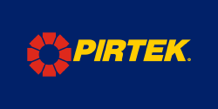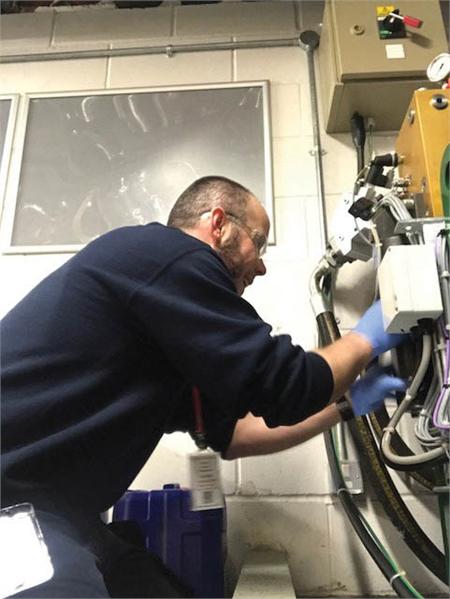Having been servicing hydraulic systems on an ad hoc basis for a number of years, Pirtek Birmingham has had a dedicated hydraulic engineer for a couple of years and in March this year Andy Connell, the franchisee, rebranded one of its vans as a dedicated Total Hydraulic Management vehicle.
“It’s about changing the customers’ perception of what Pirtek does,” he says. “We do more than just coming out, replacing a hose and leaving.
“Pirtek will always be known for hydraulic hoses, but nowadays we often go to customers and find they want the whole package – they just don’t realise we do it yet.”
Information technology plays an important role in winning repeat business.
“Customers want a database of all the hoses that are put in so at a later date they can start having them renewed. We manage people’s hydraulics and plant and reduce their downtime.”
Hydraulic flushing is clearly paying dividends for Pirtek Birmingham. Ten to 15 per cent of the franchise’s business is in hydraulic flushing and management and they only see that figure rising.
“Its generating enough work for one person to do full time and we’ve had an employee dedicated to hydraulics for two years now.”
Dedication
The franchise’s specialist engineer and driving force behind the project is Ian Cochran, who is dedicated to developing his professional skills and the scope of the business. Pirtek Birmingham’s first foray into hydraulic systems came with a request from the Royal Shakespeare Company to design, install and flush the ring main operating stage props at its Stratford theatre.
“The franchise had never undertaken such an operation before but after some deliberation, I talked Andy into doing the job,” says Ian. “We rolled the dice, pulled it off on time and under budget and the customer was over the moon. Now we service their hydraulic system every three months.”
Speaking of his career in broader hydraulics, Ian says, “The Royal Shakespeare Company is where it started for me – it was the first ring main installation that we flushed. That three-month installation was us dipping our toe in the water.
“I did all the installation and then we had an outside company build the power pack for us. Now we’d be building the power unit ourselves.”
Training is ongoing, Ian says. “I’m booked on two courses this year and then I’m going to do an intense year’s course. We’re getting involved with the electronics now, which is going to mean more training – it never stops.”
Andy fills in on more recent developments. “We’ve started to look at hydraulic service work, installation work, diagnostics and oil management, which is really starting to take off.
“When we had an enquiry from a customer who needed a substantial amount of hoses flushing we couldn’t find a third party who could do it in our timeframe and on budget so I realised there was a gap in the market.
“We looked into it and bought our own rig, adapted it to suit our requirements and it’s gone from there. That was two years ago.
“After the initial enquiry, we subbed the work out for someone to do it for us and then we got talking to another customer who said ‘Yes, that’s something that we need.’
“They talked to one of their customers and it was something they required too. So we said we’d build the rig if they used us for the hose work and we’ve been doing their hose work for quite some time now.”
Hydraulic flushing work is useful in drawing in further business, says Andy. “The hose flushing is a bespoke service that not many other hydraulic service companies can offer and without it we wouldn’t have the other hose business. “Our hose flushing work is mainly new installations so if a customer is building new power packs or ring mains that’s where we’ll get involved. We’ll supply the hoses that are flushed and ready to go into a clean ring main.”
Hydraulic flushing can be significant business for the franchise, Andy says.
“Our biggest installation to date was for EMR Midland Shredders last year. That was a complete hydraulic installation and flush of a metal shredder, which shreds scrapped cars.
“The machine batters the hydraulics to death. We’re in there every day, replacing parts, repairing, sampling and maintaining oil.
“It’s the same for Simms Metals where we look after their plant – we keep their machines running.”
Healthy Systems Verified
“As the industry gains momentum, we want to stay in front,” Ian says. “We don’t want to supply a pump or a filter, we want to supply, monitor and service the whole system. I’m working on the electronics to make this work as we speak.”
This takes the randomness out of planned maintenance. “We’re not just guessing, not just telling you your pump or filters are due to be replaced, we’re verifying what the machine’s doing,” he says.
Andy interjects, “All the hoses are flushed, capped, tagged with a unique number and put on a hose database. This data is sent to the customer and they have full traceability – when the hose was flushed, when it was made and when it’s due for replacement, based on a four-year lifespan.
“There will be sensors to monitor pump performance, speed of the motors, the efficiency of the system, pressure drops, accumulator charge pressures, everything.”
Ian continues, “We set parameters of what the machine should be doing. We watch the pumps, the systems, the valves; look for anomalies and if the algorithm output runs outside the parameters, we can tell the customer there’s a problem before it becomes apparent.
“We’ve just received the data loggers for use on site, which I’ll be able to operate remotely from the van and I’m in talks with various companies to supply the sensors and build a cloud-based
system for us.
“With the iO-link system collating all the data and putting it into the cloud, we won’t even need to go to site, we’ll be able to see it from here in the office.
“Both we and the customer can access the data remotely. Eventually, we’ll be able to make adjustments without even being on site.
“A schematic CAD drawing of the machine will have all the live data on it and in due course the customer will be able to pull parts off the CAD drawing and order them.”
Remote operation is a work in progress, however. “The challenge is finding a way of accessing the data in the cloud at all times,” Ian says. “Wherever we install this system there has to be a good internet connection.
“For now, I can monitor the system from 100 metres away using Bluetooth. What I want to be able to do is monitor the system from my armchair 150 miles away.”
Spreading the word
The man responsible for selling the service is Phil Pace. “The main thing is to ask the customer what they do currently to monitor the condition of their oil and their systems. It’s key for us to emphasise financial and time savings.
“Where you’d normally get to site and the customer would say ‘I want a pump’, we say, ‘Why did the pump fail?’ We want to be able to tell them why the component failed and what he needs to do to prevent that failure happening again.
“We do a free survey, find out what equipment they’re using and whether it’s appropriate – are they using the correct oil and is it maintained at the level of cleanliness required by the system – then we offer solutions based on that information.“In the past, we’ve gone to customers and asked, ‘Who looks after your hydraulic systems?’
“They’ll say ‘such and such a company,’ but they don’t actually know what that company is doing or whether anything they’re doing is of benefit.”
Ian and his team tailor their work to the customer’s needs, Phil says.
“We contact their purchasing department to find out what they’re buying. We contact the maintenance team to find out how much downtime they have. We will improve on that. But we need to look at the system and the oil in depth first.”
The customer might be changing a pump or valve every six months but that could be down to the lack of cleanliness of the oil.
Ian is in no doubt about the benefits. “There is no doubt you’ll save money – without fail,” he says.
“We can put someone in to do the survey in a couple of days. If something’s a show stopper, we’ll drop everything and get there straight away. A machine that’s down is a higher priority than one that is working but hasn’t been looked at for 12 months.” Phil is positive about the future. “This is a land of opportunity for us to explore. It is the next thing and it is going to be our biggest growth for the next year. We want to demonstrate to other depots that there are potentially greater margins than in hoses.”
“We’re passionate about what we do and we’re trying to make a difference,” Ian interjects. “I just need someone to ground me because I’m so enthusiastic.” We go in on the back of hydraulic hose work we’ve done and expand on that relationship. Nobody else is doing the hoses and the hydraulics systems,” Phil concludes. “We can use that to benefit customers and ourselves.”






Select a country